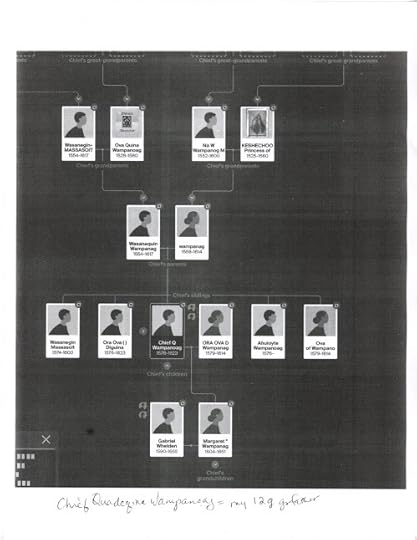Beth Kanell's Blog, page 4
August 8, 2024
Winds of Freedom Book 3 Is Coming This Autumn!
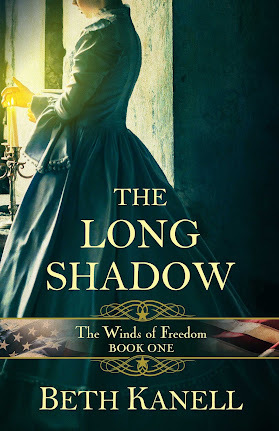
The Bitter and the Sweet, the third book in my Winds of Freedom series (after The Long Shadow and This Ardent Flame), should be in print by early November -- maybe sooner! -- from All Things That Matter Press. I know it's been a long wait (thanks to, you know, COVID). So I thought I'd give you a bit of a recap of what the young ladies of North Upton (in real life, North Danville) Vermont have been doing in the 1850s, as Vermont is seized by a passion for Abolition ... that is, the legal abolition of slavery in a nation that had profited in many ways from enslavement for two centuries.
But of course, for northern Vermont teenagers, that's not initially the focus of their attention!
Here's what went on in 1850 in The Long Shadow (can be ordered here or as an ebook here):
THE LONG SHADOW Synopsis
ALICESANBORN, age 15 in March of 1850, is the youngest member of her family and theonly one not taking a stand on Abolition. In her Vermont village of NorthUpton, she and her best friends – JERUSHAH, whose family owns the tavern, andSARAH, a younger black girl who is waiting in Vermont for negotiations to freethe rest of her family from slavery down South – are more interested in maplesugaring and the arrival of spring than in politics. Still, Alice sees enoughto guess that her married brother WILLIAM is conspiring with messenger SOLOMONMcBRIDE to protect fugitive slaves.
When aslave-hunter reaches the area, Alice’s father sends the three girls, driven bySolomon, to a nearby large town to stay briefly with the elegant MISS FARROW,herself a former slave. But theslave-hunter spies on Solomon and follows them. The girls elude danger, asAlice starts their horse and carriage north. Solomon sends the slave-hunter ona false trail, catches up with the girls, and drives them farther, despitesnow, bad roads, and a catamount.
By the timethe girls reach sanctuary with the HAYES family of Free Blacks near theCanadian border, Jerushah and Sarah are desperately ill. Solomon leaves on hisown mission. Alice meets the challenges of helping Mrs. Hayes nurse herfriends. CHARLES HAYES startles Alice by laying hands in prayer onto Sarah; heoffers the same for Jerushah, but Alice declines on her behalf, unsure herfriend would want this.
Sarahrecovers and is happy to stay with the Hayes household to await her own family.But Solomon visits and persuades Alice that Jerushah, still fretful and frail,needs to return to her own mother. Solomon, Alice, and Jerushah endure a storm,flooding, and wolves to drive home. Along the way, Alice learns about Solomon’sfreedom-fighting work and considers becoming an active Abolitionist herself – arole that won’t fit her father’s view that the Union of states is moreimportant than freeing slaves.
The returnproves disastrous: Jerushah suffers a relapse, and blame falls on Alice.Although Jerushah’s family won’t let Alice visit, there is an almost-forgottentunnel that links Alice’s home to the tavern. With help from Jerushah’s brotherMATTHEW, the two girls reconnect and begin to leave messages for each other.Alice is dismayed to realize that Jerushah’s friendship for her includesexpectations of long-term affection and living together as “spinsters,” asituation Alice does not desire. At the same time, the girls’ brothers –William and Matthew – ask Alice to help in the risky transport of documentsthat Solomon needs for men escaping slavery and headed to Vermont.
Alice learns to navigate the tunneleven in the dark. But Jerushah’s too fragile to do that, and when she tries to,she takes a terrible fall. Is it Alice’s fault again? All this guilt burdensAlice, and being part of Solomon’s righteous efforts can’t dispel the darkness.
* * *
To learn how it all works out, of course, you need to read the book! (If I told you here, that would really be a spoiler, wouldn't it?)
Watch for news about The Bitter and the Sweet, coming soon!
<font size="5">@font-face {font-family:"Cambria Math"; panose-1:2 4 5 3 5 4 6 3 2 4; mso-font-charset:0; mso-generic-font-family:roman; mso-font-pitch:variable; mso-font-signature:-536870145 1107305727 0 0 415 0;}p.MsoNormal, li.MsoNormal, div.MsoNormal {mso-style-unhide:no; mso-style-qformat:yes; mso-style-parent:""; margin:0in; mso-pagination:widow-orphan; font-size:10.0pt; font-family:"Times New Roman",serif; mso-fareast-font-family:"Times New Roman";}.MsoChpDefault {mso-style-type:export-only; mso-default-props:yes; font-size:10.0pt; mso-ansi-font-size:10.0pt; mso-bidi-font-size:10.0pt;}div.WordSection1 {page:WordSection1;}</font>
July 18, 2024
Compassion Fatigue? What If It Were a Leg Muscle?
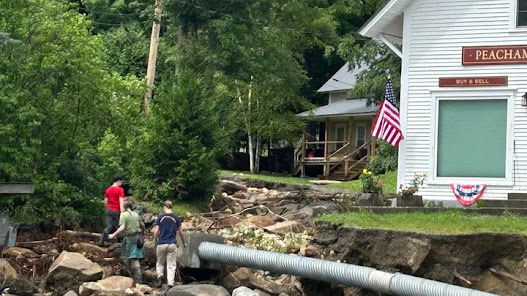
It's been a very hard 8 days here in Vermont's Northeast Kingdom, with losses and grief and discouragement, thanks to terrible flooding from a 6-inch rainstorm.
But it's also been 8 days of being amazed, touched, and proud of our communities, as people have pitched in to rebuild roads, deliver groceries, share water, and yes, provide funding for those whose homes were destroyed.
But Rachael Moragues and her sons didn't know until yesterday that their brookside house would be condemned as unlivable from the flooding, so she's not yet receiving the enormous support that's available. I'm hoping this is your moment to dip into a pocket again -- or for the first time this season -- and give what you'd appreciate receiving if you were in her shoes.
The way you care for a muscle that's overworked is to rub it some, hydrate, then stretch it. Let's stretch our hearts for Rachael. Donate here, and be part of this caring community.
July 7, 2024
Book Notes: Dark, No Sugar—from Eli Cranor, Scott Phillips, Stuart Neville
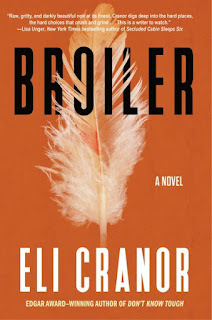
These three crime novels are all from Soho Press: two from the Soho Crime imprint, and one from a new imprint called Hell's Hundred. Brace yourself. And note that the blue links are usually to reviews I've posted earlier, often on our Kingdom Books blog.
BROILER by Eli Cranor came out last week (July 2) so you may have missed it, considering the fireworks both physical and political. I reviewed Cranor's two earlier books, Don't Know Tough and Ozark Dogs, and this new one follows his curve toward increasingly bitter exposure of hard lives in Arkansas. Being ground down by circumstance, poverty, and the power of your boss is a classic situation that breeds thoughts of revenge. "Hardworking, undocumented employees" Gabriela Menchaca and Edwin Saucedo suffer some of life's terrible losses ... and that's before you add the horrors of their work at a chicken plant.
What they can't imagine is that the rich and powerful in their lives might also have wounds. And it takes the women to sort this out. There's a lot of "ugly" to wade through in this very new take on a kidnap crime -- but there's a lot of beauty, too, in Cranor's resolution of the hot mess.
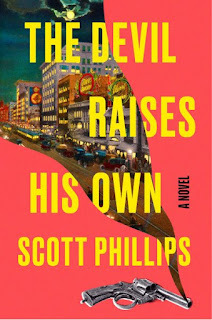
THE DEVIL RAISES HIS OWN (August 6 release) is Los Angeles noir at its richest and funniest, set in 1916 as photographers fumble with the new film technologies available—and the shocking delights of the mild porn called blue movies. Scott Phillips is known for his Midwestern noir but his 2020 That Left Turn at Albuquerque was already shifting the locale westward ... and isn't the classic noir often rooted i n LA?
When the photo would-be professionals cross paths with Bill Ogden and his studio, not to mention Bill's strong-willed granddaughter Flavia, complications multiply. Still, each of the men in this tangle has his own ways of keeping calm:
On the streetcar home from Pasadema Bill sat next to a handsome woman wearing spectacles, a basket full of vegetables at her feet. After a while she turned to him and spoke. "You hurting, mister?"
"What makes you say that?"
"You keep wincing."
He hadn't been aware of it. "I pulled a muscle in my back."
She looked him up and down, mouth pinched tight. "You look like a man's been up to some mischief. ... You have a look I recognize. A cheat. ... I can smell her eau de cologne on you. And I'll bet she's married, too, isn't she?"
Love noir, especially LA noir? Or dipping back into the start of the Golden Age of film? Pull this one onto your summer reading shelf and get ready for a lot of sneaky grins.
I would read almost anything by Belfast author Stuart Neville. His Belfast Noir books have been compelling, often threaded with the paranormal, and fisted with the generation-to-generation wounds and darkness of The Troubles. So I grabbed BLOOD LIKE MINE without realizing the shift of genre. It's quickly obvious: This is an all-American Western plus horror crossed into crime fiction, with that bloody tang of the Donner party in the background. (If you don't recall that from history class, take a moment to look at what took place back then.) It's compelling and gruesome ... and I hope that Neville isn't going to take this as an ongoing theme for a series about the historic burdens of growing up in the United States!
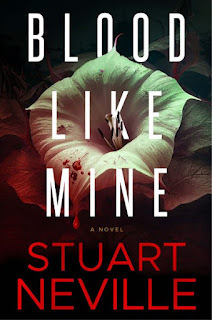
Almost anything else I could tell you about BLOOD LIKE MINE would be a spoiler -- you need to roll into it and figure out the twists as you go. I'll just tip my hat to Neville's unusual positioning of a mother and daughter and their very unusual motives for their Western journey. Shudder ....
The book's release (August 6) marks the second of the "Hell's Hundred" collection (it started in June with youthjuice by E.K. Sathue. Follow, pre-order, do all that important planning if the mingling of horror with crime and noir is your cup of ... certainly not tea!
July 6, 2024
Book Notes: Fresh Books from Hugh Laurie and Rex Stout
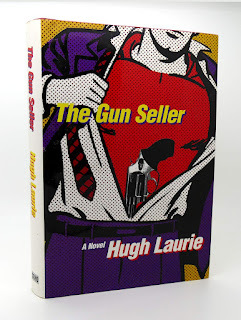 1996 hardcover
1996 hardcoverWhen I heard Hugh Laurie's crime novel THE GUN SELLER was being re-released this summer by Soho Press (which published it originally in 1996), I found the advance review copies were missing the hyped "introduction by the author" and "foreword by Stephen Fry." I bought one of the first edition hardcovers -- marked up by a library -- and dug into the story.
Laurie is a noted actor, and in the US best known recently as Dr. House in the eponymous TV series House. I was tickled to find that his sense of plot and pacing in this book, his first novel, is first rate. Either he absorbed the rhythms of his performances (also including Blackadder on TV, and 101 Dalmations among films), or he's been reading and soaking up crime fiction for a long time. Or both.
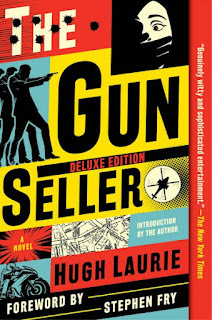 2024 softcover
2024 softcoverWhen former Scots Guard officer Thomas Lang receives a pitch for contract murder, he declines immediately and goes above and beyond the ethical call by going to see the prospective victim. That gets him into several kinds of trouble, from legal to physical, and at the same time makes him the target of an old-fashioned "honey trap" enterprise. The first half of the novel plays out as expected, with plenty of that familiar wry humor familiar from Blackadder. The second half is frankly unbelievable, but still a fun and lively read.
And now that the new edition's in print, you can read the very short intro material. But if you can grab the earlier edition, you might as well, because there's nothing of note in those added segments. The "Discussion Questions" in the new version are pretty funny, though.
Espionage fiction shelves and British humor shelves should both include THE GUN SELLER.
*
As a devoted fan of Rex Stout's Nero Wolfe series (if you ever met my darling extra-large husband, you can appreciate one reason), I rushed to pre-order HOW LIKE A GOD when it was announced in January that a never-published Stout book would be released by Hard Case Crime. It arrived as promised at the start of June. After several attempts, I've passed it along elsewhere. It's a cross between an existential exploration of a potential murderer's mind, and a grim LA-style noir, narrated as if it were an existential pseudo-novel. Not my cup of tea. If you like very dark noir and can put up with a slow pace and many diversions, give it a try and let me know your thoughts afterward. I'm going back to the Nero Wolfe series, which often warms my heart, as well as providing classic mystery narrative.
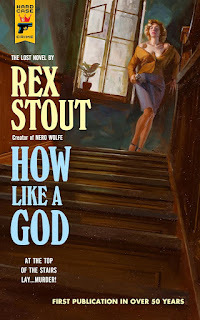
June 26, 2024
Little Fish, Big Pond: An Honorable Mention from the National Federation of Press Women
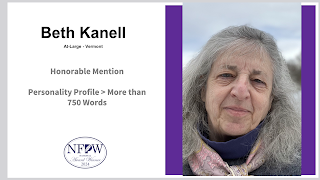
Writing is such an emotionally fraught sort of journey, at least if you're not one of the Big Fish. There's no certainly that any given piece will get into print, and if you're doing it right (at least, for me), there's a bit of your heart in each one. You really want to see it be welcomed.
So I'm "bookmarking" for myself that this is a Good Week. Although I haven't seen a poem move into publication this week, I got another very generous "hey you almost made it" rejection letter from a publication that I value. That's huge encouragement.
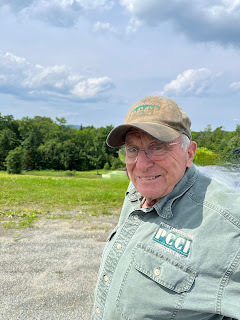 Plus some of my writing DOES regularly get into print -- the one-a-month feature articles on Northeast Kingdom people, traditions, and explorations that I write for The North Star Monthly. This week the National Federation of Press Women -- professional "communicators" from all over the United States -- gave an Honorable Mention award to my 2023 article on Bob Peters of Granby. It's a thrill to know that people across the country are taking a look at this story. He was a wonderful person to interview and I'm delighted to know that the judges caught that feeling.
Plus some of my writing DOES regularly get into print -- the one-a-month feature articles on Northeast Kingdom people, traditions, and explorations that I write for The North Star Monthly. This week the National Federation of Press Women -- professional "communicators" from all over the United States -- gave an Honorable Mention award to my 2023 article on Bob Peters of Granby. It's a thrill to know that people across the country are taking a look at this story. He was a wonderful person to interview and I'm delighted to know that the judges caught that feeling.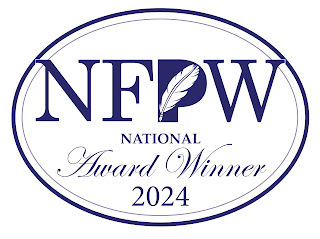
June 20, 2024
Book Thoughts: World-Building and Suspense in SPIDERWEB ALLEY and EDGE OF THE KNOWN WORLD
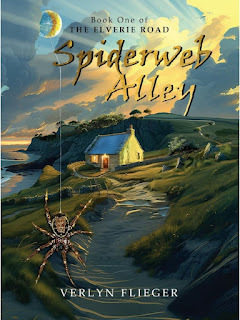
"Book One of The Elverie Road"
When I learned that author Verlyn Flieger has been called "the world's foremost scholar on the works of J. R. R. Tolkein, of course I wanted to read her new novel, SPIDERWEB ALLEY. Scheduled for June 2 5 release from Minnesota publisher The Gabro Head, it's printed in a compact chunky form, 5 by 7 in ches and about an inch thick -- which immediately suggests tucking it into a pocket or modest carrier bag, for reading between stops or efforts.
The frontspiece offers an almost poem describing a chilly seacoast with nearby mysterious forests and "curious patterns of stars." Kath and Mick, who've bonded over the search for an old book at the library's Special Collections, are driving along the coast at evening, headed to an inn, when strange things begin to happen. Kath finds herself drawn to the eccentric people and their quaint folkways, feeling as if she belongs, in a way the odd persons she connects with seem to confirm. Is this an Otherworld, a faerie place? Kath will come to know it as Elverie.
Her particpation in several faerie-related or pagan festive occasions here puts her into danger -- and perhaps even more so for Mick, suddenly in competition with a powerful mythic man who seems to know things about Kath that don't make sense to him. Soon he's denying her experience, sure she's having some form of breakdown.
The book's small shape allows a count of 362 pages for what's really a novella, or part I of a three-part longer novel. The ending's irritating in that sense, because things have really only just begun to knit together. I can't tell when the other parts of "Elverie Road" will reach print, but if you, like me, need to read this one in honor of the specialty of its author, brace for some frustration.
Flieger's novel is clearly built from the old British tales (English? Irish? Scottish?) told at firesides and on becalmed ships. Her creative aspect is the entwining of such tales with a modern and conflicted marriage. I'm holding off on deciding whether it "works" until I see the rest of the story in the sequels.
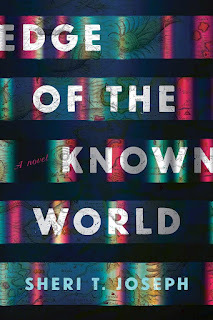
Dictatorships, Expanded Conflicts, and Genetic IDs
EDGE OF THE KNOWN WORLD (SparkPress, Sept. 2024) is described as the debut novel by Sheri T. Joseph, but from the level of expertise involved in world-building here, I'd have to guess she's written plenty of other material while learning her craft.
Alexandra Tashen is super bright and has earned her PhD early enough to be a postdoc student at age 23. She's also surprisingly naive, considering how much grief she's witnessed already, with a missing father and genetic inheritance that puts her in danger daily. Any random ID screening could show up the not-quite-erased tagging gene that her father tried to spare her, and she'd be instantly a criminal and lose her career and lifestyle as well as freedom. And self-respect.
The professor she's working with Kommandant Burton, is part parental and part mentor and mostly, although Alex doesn't quite realize it the implications, militaristically in charge of a lot of the almost-free part of the world. Wars familiar to us today have multiplied, fractured, and realigned the nations; the Kommandant is a general and a West Point alum and is in control of her group of factions.
The most significant aspect of this "world," though, is clearly built from today's American and even global politics: Someone's exerting unusual hacking skills on behalf of those who need asylum. The entire world of politics and conflict is balanced on who'll be allowed movement between which regions.
Alex is sometimes less interesting than her Kommandant, Suzanne Dias Burton (authors beware: that's a risky framework). Here's my favorite half page, as Suzanne interacts with a Russian-style counterpart who's just suggested that global instability justifies continued control:
"Gallows humor," said Bulgakov. He had the tranquil composure of a tortoise. "For many here, the refusés in the Netcast are separated family. They remember the kindertransports."
Suzanne stiffened, and checked for implied criticism. The kindertransports had smuggled children out of the Federation for several years following the Treaty, until the g-screens made it impossible to hide them. The children were returned. with scenes of screaming families that still rose in Suzanne's worst dreams. But Bulgakov's face remained serene. Suzanne wondered if it was possible for him to be outraged or shocked. Perhaps nothing surprised him anymore.
The book's finale is a strange one, half soft, half provocative. If there's a sequel, which seems likely, I'll be lining up for a copy. By the way, EDGE OF THE KNOWN WORLD will surely be compared with Atwood's The Handmaid's Tale -- but I think it's much closer to pushing today's politics to a believable extreme. Nicely done.
June 16, 2024
And More Poems ...
Such a pleasure to enter the pages of RockPaperPoem with "The Next Stage of Grief": link here.
I've been having a great time sharing my poem "Rocks," which was the first runner up for the Steve Kowit Poetry Prize -- I flew to San Diego to accept the award and meet some of the other poets.
 My moose went with me to the Pacific Ocean.
My moose went with me to the Pacific Ocean.Rocks
In New England, we grow them—harvest them, stack them
along the edges of fields. Good crop? Not bad this time.
After spring’s lines of lavender and late roses
half a year of long lament, laid as a line of stones. Mylife in
widow world: Would he have watched this season’s harvest? Praised
fat tomatoes in a bowl, purple berries, pinecones?
He would. So I carry him close, as his spirit snuggles
in my hip pocket, speak his name, sing louder, share a smile.
When night falls, I shoulder silence, dinner for one:
which drove me to delve and define “inselberg,”
tongue-tossed by a mining geologist in east Africa seduced
by the Serengeti, where lions hunt from high crags—
rock knobs risen through weather and resistance. On my
tongue next, the term “monadnock,” indigenous form for lone
mountain surviving. In New England we live with our past:
words absorbed from Abenaki assertion, stones heaped aswalls
around our burial grounds. We witness forests reclaim farms.
Find old foundations of granite and grit
dark, cold, exhaling radon remnants. I gave my love
a marble marker for his grave, engraved with names. Geology
rasps rough on this rainy evening, looking up
igneous, formed from fire, blazing birth ofcoarse-grained rock
laid down in wide intrusions at this world’s skin. I grasp:
granite grows a wrap of lichens, palest green, rooting
in the grains from which the stone steals its name. Words wrestle,
weathered stones subsiding into soil. Widow world wanders,
walking steep slopes; in loss, the gray-green lichens linger.
-- BK
And if you missed my St. Johnsbury poem "I See You," you can listen to it again (and read it below the audio part) -- at Gyroscope Review: click here.
Plus you can both see AND listen to this poem, "TEEN SUMMER," at The Post Grad Journal -- click here.
There, I'm a little bit caught up, and I'll fill you in on summer publications very soon. Thanks for reading along!
@font-face {font-family:"Cambria Math"; panose-1:2 4 5 3 5 4 6 3 2 4; mso-font-charset:0; mso-generic-font-family:roman; mso-font-pitch:variable; mso-font-signature:-536870145 1107305727 0 0 415 0;}@font-face {font-family:Calibri; panose-1:2 15 5 2 2 2 4 3 2 4; mso-font-charset:0; mso-generic-font-family:swiss; mso-font-pitch:variable; mso-font-signature:-469750017 -1073732485 9 0 511 0;}p.MsoNormal, li.MsoNormal, div.MsoNormal {mso-style-unhide:no; mso-style-qformat:yes; mso-style-parent:""; margin:0in; mso-pagination:widow-orphan; font-size:12.0pt; font-family:"Calibri",sans-serif; mso-ascii-font-family:Calibri; mso-ascii-theme-font:minor-latin; mso-fareast-font-family:Calibri; mso-fareast-theme-font:minor-latin; mso-hansi-font-family:Calibri; mso-hansi-theme-font:minor-latin; mso-bidi-font-family:"Times New Roman"; mso-bidi-theme-font:minor-bidi; mso-font-kerning:1.0pt; mso-ligatures:standardcontextual;}.MsoChpDefault {mso-style-type:export-only; mso-default-props:yes; font-family:"Calibri",sans-serif; mso-ascii-font-family:Calibri; mso-ascii-theme-font:minor-latin; mso-fareast-font-family:Calibri; mso-fareast-theme-font:minor-latin; mso-hansi-font-family:Calibri; mso-hansi-theme-font:minor-latin; mso-bidi-font-family:"Times New Roman"; mso-bidi-theme-font:minor-bidi; mso-font-kerning:1.0pt; mso-ligatures:standardcontextual;}div.WordSection1 {page:WordSection1;}
April Was Poetry Month ... and It Hasn't Seemed Over Yet
I started April with a poem presented in St. Johnsbury's PoemTown event, framed around the solar eclipse -- and then on April 4, had this lovely news (scroll:
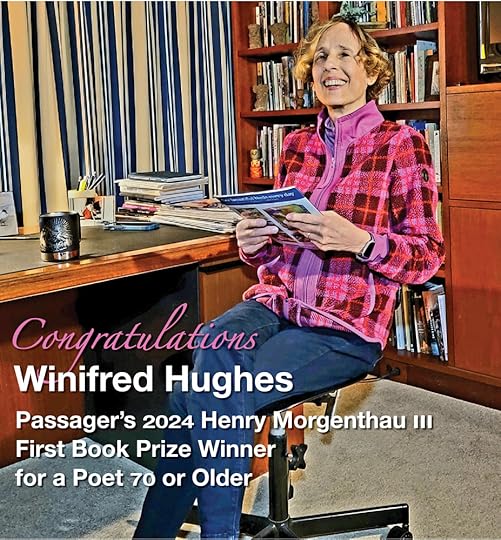
Winifred Hughes from Princeton, New Jersey is the 2024 Henry Morgenthau lll First Book Winner for her book of poems The Village of New Ghosts, due out in Fall 2024. The prize recognizes a poet 70 or older who has not yet published a full-length collection. from the Judge:
The task of “the poet” is brilliantly fulfilled with sonics, structure, detail, richness and care. But where this book truly exceeds and excels is in creating a hologram of emotions, a reality we can enter, where aesthetics are crisp and clear enough to create a new paradigm. Poetics that bring emotional worlds into existence have to be held in place with mastery. Someone is obviously in charge of this work. Someone is in control of its precise syntax and beautiful heart. I never wanted to stop reading.
Grace Cavalieri, former Maryland Poet Laureate
Congratulations to our honorable mentions!
Runner-Up:
Rick Rohdenburg from Duluth, GA: Crows Fly from My Mouth
Finalists:
Melissa Cannon from Antioch, TN: Doll/Face
Kathy O’Fallon from Carlsbad, CA: Listening for Tchaikovsky
Semi-Finalists:
Karen Bashkirew from Bozeman, MT: Stillpoint
Sheila Bonnell from South Orleans, MA: Albedo
Helen Bournas-Ney from New York, NY: Just Like the Sky, but Nearer
Helen Chinitz from Walton, NY: If Summer Sear the Landscape
Sandra Cutuli from Los Angeles, CA: Tracks and Signs
Marc Douglass-Smith from Lebanon, NH: A River in Still Life
Deborah French Frisher from Mill Valley, CA: Howl Now & 52 Other Poems
Gordon Grilz from Tucson, Arizona: Just North of My Dreams: A Collection of Poems from Prison
Judy Kaber from Belfast, ME: Landscape with Rocks, Sky, Nails
Elizabeth Kanell from Waterford, VT: Break-Out Room
Ellen Lager from Robbinsdale, MN: Buried Beneath All That Love
Nancy Meyer from Portola Valley, CA: The Stoop and The Steeple
Michael Mulvihill from Staunton, VA: The Distant Pines
Phillip Periman from Amarillo, TX: Dying: The First Six Years
Jim Scutti from Vero Beach, FL: Family Planet
Richelle Slota from San Francisco, CA: Letters to My Dead Name
Jil St. Ledger-Roty from Franklinville, NY: Lost and Found and Lost Again
Steven Winn from San Francisco, CA: Late Light
Avra Wing from Brooklyn, NY: Mammoth Life & Accident
Cynthia Woods from Philadelphia, PA: Lines Over 70
For those who are curious -- Break-Out Room is a collection of poems, at the length called a chapbook. It's back out in another competition, and I'll let you know when it garners its next award. I'm following in the footsteps of some of the best writers I know in this decision: Each time it doesn't quite reach a book contract, polish it a bit more and add more skill and joy to it, and send it out again.
April 24, 2024
One Traditional Crime Novel, One International Thriller
"Genre" fiction still has to meet the standards of good writing: strong characters, a sense of place, and in a plot that makes you want to open the next chapter. When you reach the last page, there should be some form of satisfaction -- and if there's frustration too, that's got to fit with an expectation that developed while you were getting acquainted with the author's temperament and motives.
But genre fiction —in this case, crime fiction, mysteries, and thrillers — also has to meet more criteria, because readers understand them as "game rules." For example, the mystery can't be solved by a walk-on character saying "Oh, didn't I tell you, I saw my uncle buying that rifle?" As another example, crime fiction doesn't generally allow ghosts into the picture (unless you are reading Stuart Neville; yes, highly recommended but, as we say in New England, it's wicked dark).
These two books are classic genre fiction, but "deeper, stronger, better," because the authors bring a powerful motivation to shape your experience and have the well-honed skills to do it.
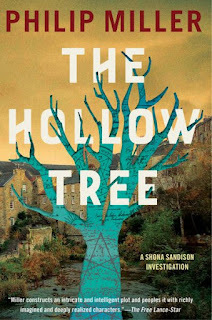
First, consider THE HOLLOW TREE by Philip Miller. Don't judge this by the cover, which looks a bit like a desert cactus in color shades speaking of Arizona ... the actual setting is a small gritty town in north England where crimes can linger unsolved for a generation and memories and resentments can reach even further.
With his second crime novel, Edinburgh author Philip Miller comes into his prime. The first sentence of THE HOLLOW TREE offers a perfect example of this book's engrossing pattern of laying out one truth, then pulling it back: "Shona Sanderson was going to a wedding. The day would end in death."
Sandison is an investigative journalist, now saddled with a permanent disability that forces her to maneuver with a supportive cane ("stick" in British) and leaves her always off balance. So does the case she tumbles into, as she witnesses the gory suicide of a wedding guest. Miller presses Shona into overwhelming conflict when what she witnessses threatens to destroy her valued friendship with the bride-to-be. An as a caustic, insightful, and probing person, Shona's got very few close friends. The more she pushed for answers to a set of hidden crimes, the more she risks devastating consequences to the people she treasures—and herself.
Reading THE HOLLOW TREE parallels eating a globe artichoke, leaf by leaf. Your teeth scrape the sweet richness at the bottom edge of each, but you can't reach the aromatic heart of the 'choke until you complete the disrobing. In a steady accretion of toxic loyalties and occult dangers, Shona exposes how a core of evil has infected the community across time and can shatter strong bonds of love. Shona's body can't always do what the circumstances demand. But her insistence on revelation becomes the core of Miller's demonstration that the texture and questioning of crime fiction create an ideal lens for the dobt, anger, and passion of our time.
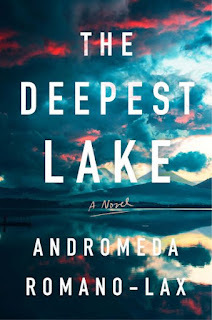
Though it's also "genre" fiction and even published by the same firm (Soho Press under its Soho Crime imprint), Andromeda Romano-Lax's THE DEEPEST LAKE couldn't be more different. Revolving around an upscale writing retreat in Guatemala on the shores of Lake Atitlán, complete with a charismatic writing teacher known for unpleasant memoirs, the story quickly establishes a mode of threat, danger, and deceit. Alternating points of view in the present tense, although they may reflect different time periods, challenge readers to stay alert and pin the evidence together around the disappearance of Rose's grown daughter Jules. Rose's ex-husband already funded a conventional search for their daughter at the lake, and concluded she was dead. Rose pretty much believes that too, but can't leave the loose threads alone as she mourns and faces her own despair and helplessness.
Experienced thriller readers may see the fierce psychological darkness that Ruth Rendell instituted in British thrillers under her pen name Barbara Vine. These frightening books (best not read at bedtime) exposed the horrors a twisted psyche can impose on others. Because of how Romano-Lax plays out her various points of view, readers know what's going on and where the threats are coming from, long before Rose does — which can be frustrating. But it's also playing fair with the traditions of thrillers, which pin the reader into a form of helplessness like that of the victim or victims in the book.
Another parallel to this work, set on the American side of the ocean, is the Maine paranormal mystery series offered by John Connolly, where again it's the wickedness of some human hearts that drives the threats and harsh disasters of the fiction. Hat tip to Romano-Lax for probing a fresh setting at a time when Central America is becoming part of a prevailing US nightmare of difference and greed.
April 20, 2024
Identity: Nature, Nurture, and Choice
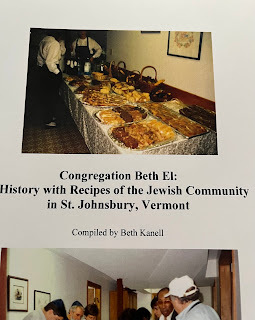
My grown sons are rarely interested in my "family tree" discoveries; I think that's probably healthy! On my mother's side, I'm 75% New England and 25% Philadelphia-centered Quakers, all dating back to America's earliest days; my father's side is European Jews, and one of my second cousins has taken that tree back to the Middle Ages. I've found that interesting, but not necessarily life-changing.
Finding Dave in 2002 (we married a year later) changed my identity in much deeper ways. I reflect on this especially in the Jewish holiday seasons -- Passover is about to start on Monday evening, and I think about how I've shaped my own observance of this important piece of Jewish history and identity. Mostly I'm on the quiet end of that holiday spectrum: I'll prepare a few traditional foods for Passover, and of course keep writing pertinent poems.
When my novel The Darkness Under the Water was published in 2008, it faced some fierce online attacks from three Native American women who assumed that the facts of the story were wrong, because I didn't have a Native American identity myself, and also assumed that I was trying to "make money" off a story that didn't belong to me. Neither of those was true: The facts in the story are particular to this part of Vermont and were thoroughly researched. And I only lost money on the book, including the part of the story that was "mine" in some ways.
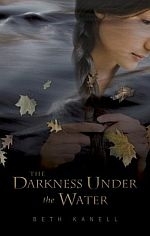
But I wanted to write it for two big reasons. The first relates to my mother's Quaker ethos: I'd discovered the terrible injustices (horrors, really) of the Vermont Eugenics Project and wanted to bring attention to those through a "relatable" story -- that's how I often pay attention to history myself. The second was my entry into Jewish identity as Dave's wife, my father's daughter, and an absolute beginner in absorbing traditions and culture of this venerable faith. I crafted the character of Molly in the novel with a similar position: a bit curious about the Abenaki culture that remained around her, but not well informed. That was also a good way to follow the instructions of esteemed Abenaki author Joseph Bruchac, who had warned me not to try to step inside a culture that I didn't and couldn't grasp.
Now I have indeed formed a full Jewish identity, one that reflects my father's family journeys. I honor the Sabbath, participate in a Jewish congregation, study texts in groups, write related poems, and can prepare a lot of Jewish recipes, including some challenging ones that belong to this Passover season. I know the names of five members of my father's family who perished by murder in the Holocaust. (Far more of Dave's relatives were killed then, too.) I've invested years and passion in this long change, which after Dave's 2019 death became increasingly vital to me. I love what I've learned and how it's forged my identity.
Recently one of my siblings and one of my sons asked about the Native American part of my mother's family history. It dates back to the late 1600s, to the Wampanoag. At my age, and having already committed myself to one cultural path, I still want to know more about this small corner of my birth family. So, watch for details this summer, when I explore this. It didn't play a role in writing The Darkness Under the Water, which feels appropriate -- it's never been a culture that I lived within or chose, and the Wampanoag identity doesn't include Vermont, but instead the New England coast -- but it's time to catch up with another thread of how I came to be this person, in this very American life.
